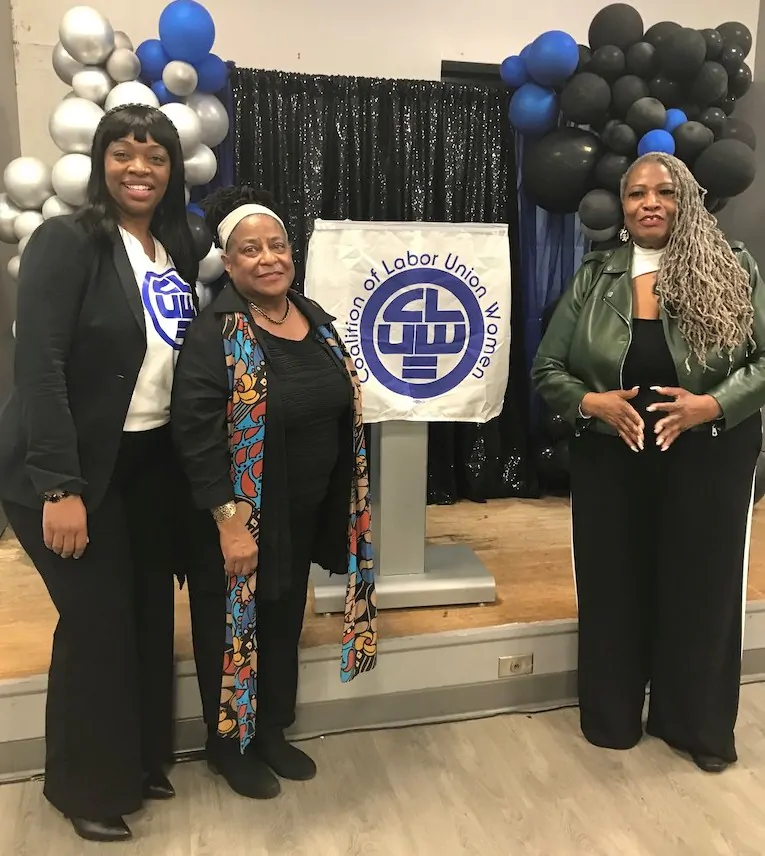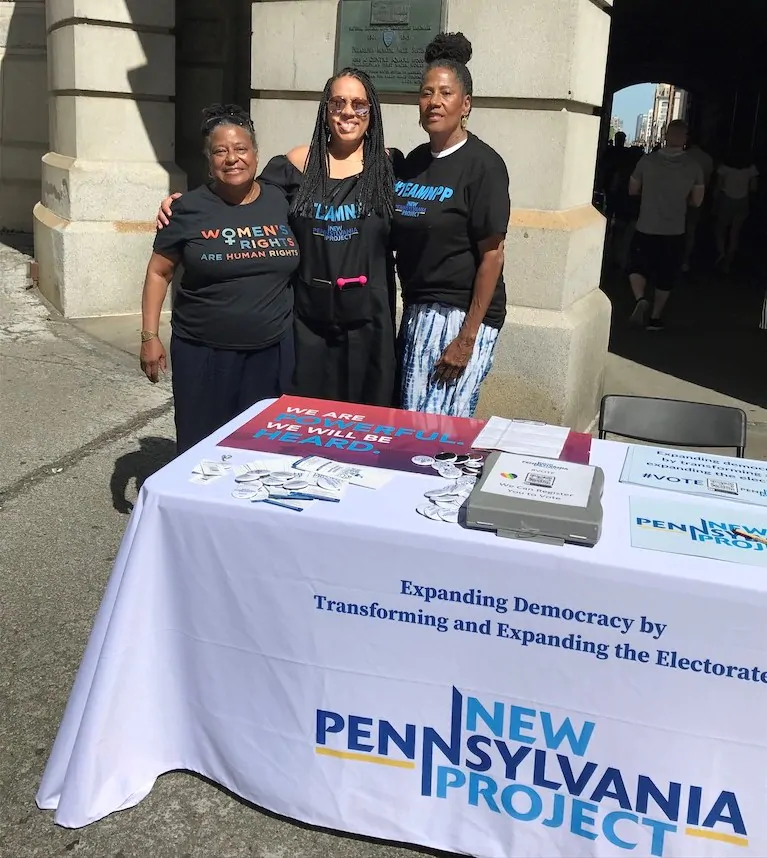Jovida Hill: Leading with intentional collaboration and authenticity

Jovida Hill (middle) with collaborators at a Coalition of Labor Union Women event.
The Equitable Community Engagement Toolkit is filled with people’s stories. This post honors one of those people: Jovida Hill.
Jovida served as an internal advisor and cheerleader to the Equitable Community Engagement Toolkit project team. We caught up with her in the Spring of 2023. Below is an edited version of our conversation.
To start, tell us a little bit about who you are and what you do at the City.
My name is Jovida Hill. I’m the Executive Director of the Mayor’s Office of Engagement for Women and the Philadelphia Commission for Women. In both roles, the goal is to promote gender equity and social and economic issues that improve the lives of women and girls.
What’s the importance of equitable community engagement in the work you do?
First off, not all engagement is the same. In government, sometimes engagement has to do with fixing what the government has done wrong. One of the things that government is very good at or insistent about is having engagement practitioners fix what they’ve already messed up. That’s one of the hardest things for government to learn [or improve] because our leaders aren’t always thinking of being inclusive from the beginning rather than being inclusive after there’s a problem. If you’re inclusive at the outset, it avoids problems.
The type of engagement work that my office does is to act as a megaphone. We provide a platform for the folks in the trenches. That platform, and that megaphone, helps elevate some of the issues [that communities are advocating for and working to address].
To share an example: In 2018, [our office] conducted a townhall around the issue of Black mothers and babies dying and what could be done about it. It was a cold, rainy Saturday in December in West Philly, a week before Christmas, and we ended up having standing room only. I had to turn people away because this was an issue that was bubbling up [for so many people]. That townhall was only the beginning of work we did to get recommendations [all the way to the State office in] Harrisburg as well at the City of Philadelphia. And now in 2023, there’s a collective impact program working on maternal disparities, an upcoming summit on maternal mortality disparities and maternal health, and many of those recommendations have been worked on. I think this falls in line with the saying “travel at the speed of trust”, because at the outset of our work, it was an inclusive and collaborative approach.
“We try to do things that are not one-off [engagements]. We build, build, and build. What I can’t impress enough of is that if you’re [inclusive and collaborative in your] engagement, 95% of this work is relationship building.”
– Jovida Hill
You’ve been driving equitable community engagement work at the City often as a team of one or a few people, and without a lot of resources. How do you advocate for more meaningful engagement with City leaders who may want you to move quicker than what’s required to build trust and deep relationships?
I think that’s the challenging part because in government, it’s often about metrics. But what are the metrics that you use for relationships? Quite frankly, leadership doesn’t always understand this. It might seem indelicate but the work in and of itself is the advocacy. Period.
And I’m so proud of the collaboration my office has been a part of! For example, with over 100 organizations we’ve advocated for Fair Workweek Scheduling and the Bill of Rights for domestic workers. We were part of pushing it up the hill whether that meant expanding our network for rallies on the issue or calling people to attend City Council hearings.
“This work is nothing that you do by yourself. When resources are lacking, how you play a role is in collaboration with others. You don’t have to be the driver. It takes staffing to lead and drive and I don’t have the capacity for that. What I do have the capacity for, is to uplift those who are driving and to be behind pushing the car.”
– Jovida Hill
I also want to emphasize that leveraging City resources like partnering with community-based organizations to provide additional staff members, speakers for events, expertise, access to meeting spaces, etc. can be valuable when you’re working with limited resources.
When engaging communities in your role, have you ever experienced the tension of balancing your identity as a representative of the City versus that of a community member or resident? What advice would you share with engagement practitioners grappling with this tension?
I show up as my authentic self, no matter the forum or space. [I do that by] bringing in my perspective. My perspective—whether it’s in my role as a City employee or my role as a resident—is still a valuable perspective, and I don’t leave it at home. Now that does not mean I haven’t gotten in trouble or been told that I should not have presented myself that way. But I don’t know any other way of presenting myself!
So, my advice to engagement practitioners is to be true to yourself. This kind of work requires a self-evaluation of your values. And when you assess your values, you know when to say no. Relationship building is 95% of this work.
And the other absolutely necessary ingredient is respect. You have to respect the folks that you’re collaborating with.
To learn more about Jovida’s work, visit the Mayor’s Office of Engagement for Women website.

Jovida (left) gathers with community members at a Civic Saturday event outside City Hall.